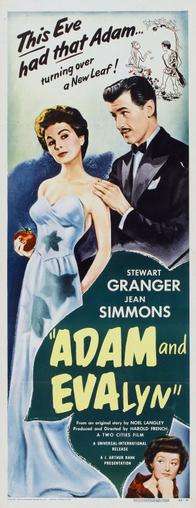Adam and Evelyne
| Adam and Evelyne | |
|---|---|
 Poster with the American title | |
| Directed by | Harold French |
| Produced by | Harold French |
| Written by |
Noel Langley (story) George Barraud Nicholas Phipps Lesley Storm |
| Starring |
Stewart Granger Jean Simmons |
Production company | |
| Distributed by | Rank Films |
Release date | 31 May 1949 |
Running time | 70 minutes |
| Country | United Kingdom |
| Language | English |
| Box office | 189,023 admissions (France)[1] |
Adam and Evelyne, released in the U.S. as Adam and Evalyn, is a 1949 romance film starring Stewart Granger and Jean Simmons. According to Robert Osborne, host of Turner Classic Movies, this suited the stars, as they were romantically involved at the time, despite their age difference. They married the next year.[2][3]
Plot
When jockey Chris Kirby (Fred Johnson) is fatally injured in a horse race, he gets his best friend, gambler Adam Black (Stewart Granger), to promise to take care of his teenage daughter, Evelyne (Jean Simmons), who has been raised apart from her father. Unbeknownst to Adam, Evelyne had been led to believe that Adam is her father in correspondence between parent and child. Adam is unable to tell her the truth; his butler and friend Bill Murray (Edwin Styles) tries and fails as well. Finally, Adam's sometime girlfriend Moira (Helen Cherry) breaks the news to the girl.
Adam sends Evelyne to an exclusive boarding school. When she has grown up, she reappears unexpectedly in his life. Because of the hatred she has for gambling, Adam does not reveal that he stages illegal gambling sessions; instead he tells her that he makes his money on the stock exchange. She begins casually dating Adam's no-good brother Roddy (Raymond Young).
When Adam tells Moira that he is getting out of the business, she accuses him of being in love with his "ward". Roddy has his own grudge against his brother - Adam refuses to finance a shady deal - and the two of them tip off the police about Adam's last operation. Roddy also brings Evelyne to see what Adam really does for a living.
Shocked, she quarrels with Adam and leaves. A kindly gambler, Colonel Bradley (Wilfred Hyde-White), gives her some sage advice and persuades her to reconcile with Adam.
Cast
- Stewart Granger as Adam Black
- Jean Simmons as Evelyne Kirby
- Edwin Styles as Bill Murray
- Raymond Young as Roddy Black
- Helen Cherry as Moira
- Beatrice Varley as Mrs. Parker, a gambler
- Joan Swinstead as Molly
- Wilfred Hyde-White as Colonel Bradley
- Fred Johnson as Chris Kirby
- Geoffrey Denton as Police Inspector Collins
- Peter Reynolds as David
Production
Stewart Granger says the storyline of the film was his, based on the old silent film Daddy Long Legs, He contacted the writer Noel Langley and they wrote it as a vehicle for Jean Simmons. "It was a very good vehicle for her," he said. "It was a sweet film, a charming light comedy."[4]
Director Harold French also said he "really liked" the film.[5]
This was the first adult role of Jean Simmons, who had become a star in Great Expectations.[6]
Simmons and Granger were rumoured to be romantically involved during filming although they denied it to the press.[7]
Production of the film was interrupted by a strike from crew members at Denham Studios in protest over recent sackings of film workers. (Others which ceased production were The Cardboard Cavalier and Tottie True.)[8]
Reception
The film was voted best comedy of the year at the International Film Festival in Locarno Switzerland.[9]
It was reportedly successful at the box office.[10]
References
- ↑ Box office information for Stewart Granger films in France at Box Office Story
- ↑ "Wedding bells mean journeys for Jean Simmons.". The Australian Women's Weekly (1933 - 1982). 1933 - 1982: National Library of Australia. 30 December 1950. p. 31. Retrieved 20 June 2015.
- ↑ "Romance started for Jean Simmons when 14.". Sunday Mail (Brisbane) (Qld. : 1926 - 1954). Brisbane) (Qld.: National Library of Australia. 14 January 1951. p. 15. Retrieved 20 June 2015.
- ↑ Brian MacFarlane, An Autobiography of British Cinema, Methuen 1997 p 231
- ↑ Brian MacFarlane, An Autobiography of British Cinema, Methuen 1997 p 213
- ↑ "JEAN SIMMONDS TO FACE F/LIGHTS.". Townsville Daily Bulletin (Qld. : 1907 - 1954). Qld.: National Library of Australia. 16 November 1948. p. 4. Retrieved 20 June 2015.
- ↑ "Famous stars are real-life friends.". The Australian Women's Weekly (1933 - 1982). 1933 - 1982: National Library of Australia. 8 January 1949. p. 32. Retrieved 20 June 2015.
- ↑ "FILM STRIKE.". Sunday Times (Perth, WA : 1902 - 1954). Perth, WA: National Library of Australia. 31 October 1948. p. 12 Section: The Sunday Times Sporting Section. Retrieved 4 March 2013.
- ↑ DEVELOPMENT CHARGES. (20 July 1949). The Scotsman (1921-1950) Retrieved from http://search.proquest.com/docview/482729392
- ↑ "FILM NEWS.". South Western Advertiser (Perth, WA : 1910 - 1954). Perth, WA: National Library of Australia. 16 June 1949. p. 15. Retrieved 20 June 2015.